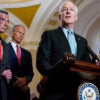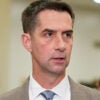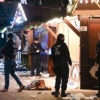Ruby was unable to pay her rent and had been evicted from her apartment. Now she was drenched in the rain.
“I was sitting out in the rain with all my stuff lying around,” Ruby said. “My daughter and I sat there all day.”
That’s when Catholic Charities of Washington, D.C., stepped into help. Ruby went to the Harriet Tubman Emergency Women’s Shelter, a low-barrier spot for women over the age of 18 who are in urgent need of housing, food or case management.
“They’ve given me a roof over my head, three meals a day, and someone to talk to if I have a problem,” Ruby said.
In addition to serving breakfast, lunch and dinner, the shelter staff assists the 100 women with life skills, employment, hygiene issues, drug rehabilitation and financial management.
Diana, another woman staying at the shelter and former medical office assistant, has been taking advantage of the programs the shelter has to offer, including attending job fairs.
“I’ve been working very hard to get myself out,” Diana said. “It’s not somewhere I ever expected to be in my life.”
Diana and Ruby, who asked us to not use her last names, have hope thanks in part to Catholic Charities. But now, as a result of Obamacare’s anti-conscience mandate, the organization might not be able to provide that assistance in the future.
Catholic Charities of D.C. faces uncertainty due to the mandate, which forces almost all insurance plans to provide and pay for coverage of “preventative” services, including abortion-inducing drugs, contraceptives and sterilization. The alternative is a hefty fine that, in the case of Catholic Charities of D.C., could exceed more than $1.6 million per year.
The mandate, finalized by the Department of Health and Human Services earlier this year, prompted Catholic Charities of D.C. to file a lawsuit against the federal government. It is one of 58 plaintiffs taking legal action.
During a campaign stop in Colorado yesterday, President Obama defended the HHS mandate. He also falsely claimed his administration “worked with Catholic hospitals and universities to find a solution that protects both religious liberty and a woman’s health. The so-called “accommodation” is simply an accounting gimmick, according to Heritage’s Sarah Torre.
In order to be exempt from fines, Catholic Charities of D.C. would only be able to employ and serve Catholics. That stands in stark contrast with the organization’s mission.
“We don’t do these things because [the needy are] Catholic. We do these things because we’re Catholic. That’s who we are,” said Msgr. John Enzler, president and CEO of Catholic Charities of D.C. “Our programs serve 80 percent of those who are non-Catholic.”
Enzler added: “Instead of asking “what is your faith,” we can ask “what do you need.”
In 2011, Catholic Charities of D.C. significantly helped the needy:
- An estimated 37,700 families were helped with family services. These include supportive housing for teen parents, assistance for families considering adoption, emergency rent and utility assistance, groceries, case management, crisis intervention and referrals.
- There was an increase of 115% for people who escaped dangerous winter weather in one of its 11 hypothermia shelters.
- Approximately 6,000 employment referrals were made through itsSpanishCatholicCenter. These include connecting job seekers to job openings, referrals to job training and readiness programs and helping with resumes and the interview process.
- The organization experienced a 52% increase in the number of people with learning and developmental disabilities who participated in the Kennedy Institute’s adult education programs.
- About 4,800 foreign-born people, including refugees, asylees and victims of human trafficking, received assistance through itsRefugeeCenterand Immigration Legal Services.
- More than 2,000 meals per day were served through Charities Catering, which employs adults with mental-health challenges or developmental disabilities.
Enzler described this moment as the “perfect storm.” He said, “We have an economy that has diminished, people’s philanthropy has also become a little bit limited because their own income has diminished, and then you have the needs of the poor coming up.”
Now the HHS mandate threatens Catholic Charities of D.C.’s ability to continue making significant contributions to help people like Diana and Ruby.
“I’m just very glad I have a place to stay,” said Diana. “They’ve all been a great help.”
Melanie Wilcox and Luciana Milano are members of the Young Leaders Program at The Heritage Foundation.





























8 Replies to “Obamacare Mandate Harms the Poor: A Case Study of Catholic Charities”